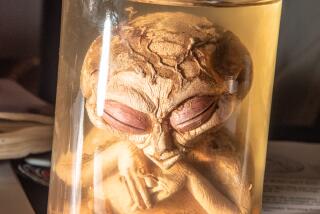A Richly Detailed Look at 5 Unconventional Spiritual Groups
- Share via
Religious life is one of the cornerstones of American identity, but any binding ideal of how and why we approach our spiritual lives is hard to pin down. In a country founded on the principle of religious freedom, unorthodox ideas about God and how to worship him flourish. In “Godtalk,” Brad Gooch explores these unorthodox ideas on a mission to document some of the nation’s more unusual spiritual communities.
A self-described Episcopalian from Manhattan, Gooch sets out to describe a sometimes unconventional group of spiritual communities and to place them in a world in which religion is increasingly a hyphenated identity.
“What were they wearing? How did they talk?” he asks himself, as he sets out to perform research from the field. To answer those questions, “Godtalk” delves into five different groups: the followers of the cultish “The Urantia Book”; New Age guru Deepak Chopra’s packaging Hinduism for export into America; the monastic lives of a group of Trappist monks in Kentucky; a gay Christian community in the South; and the life of a Sufi mosque in New York City. Gooch seeks to trace the origins of these movements to their modern-day incarnations--to connect the dots between what these movements were in their origin to what they have become today.
On a visit to the Trappist monks of Kentucky’s Our Lady of Gethsemani (the monastery that inspired the spiritual awakening of Thomas Merton), Gooch’s portrayal of the flourishing of spiritual tourism--vacations to a monastery for a week of spiritual renewal--versus the drastically declining numbers of the actual monks speaks volumes about our contradictory culture.
Gooch suggests that Americans desperately seek the solace and comfort religion can provide, but are unwilling to make the self-sacrifices to ensure the survival of religious communities. When one monk comments on his brothers’ declining numbers--”We’re not here to keep an institution going; we’re here to lead honest lives”--Gooch’s observation that “the abbeys are simultaneously dying and trending up” is right on the nose.
Where Gooch’s careful detailing is less successful is in the somewhat digressive chapter on “The Urantia Book.” Gooch traces the unusual history of “The Urantia Book” in Chicago as the work of a psychiatrist connected to the Kellogg family of cornflakes fame. That psychiatrist, William Sadler, claimed the book was transmitted directly from extraterrestrial beings to a medium, who then channeled the otherworldly messages that are a bizarre mixture of science fiction and Christianity.
Though trying to be respectful of his subjects, Gooch sometimes doesn’t apply enough critical thought to make the discussion seem worthwhile. When he writes of “The Urantia Book” followers that “so far the movement is making up its rituals as it goes along,” the reader’s response is: Then how are they formed enough to be written about? Instead of illuminating the reader about what believers of this movement expect their fulfillment to be, he devotes most of the chapter to speculations as to how much of the book was directly channeled from extraterrestrials or taken from scientific and spiritual writing of the 1920s. Not surprisingly, the one member of the community who seeks to find the answer to that question finds himself living in exile in California.
“Godtalk” is a compelling chronicle of some decidedly odd-ball religious beliefs, even though it doesn’t give a real sense of how spirituality can transform us in the new millennium. Perhaps it is too soon to tell.
Still, the book is a richly detailed examination of fringe religious movements in America that seems to prove the point that it has been a continual theme in our country to innovate ever more creative ways of connecting to our various ideas of God.
Reading about that might be amusing, even if it is certainly nothing new. As for America’s religious future, Gooch says that conversations he has had in researching this book have led to him the conclusion that “in the next five years, more Americans would be traveling with spiritual passports--often dual passports--stamped with some very colorful visas.”


